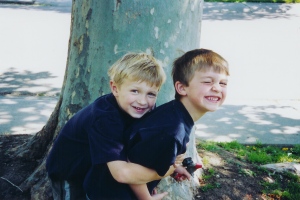About a month ago, I tweeted a little snark at Cameron Crowe about the poster for his upcoming film, Aloha. I was shocked to get a response. I wasn’t shocked, however, when the film turned out to be exactly what I thought it would be— a film about white people with some HAWAII used as, essentially, set dressing. Perhaps Crowe was assuming I might be pleasantly surprised by the inclusion of Hawaiian sovereignty activist Bumpy Kanahele (in a bit role as himself). But I think, most likely, he was assuming I’d be pleasantly surprised by the fact that one of the female lead characters is hapa, a Hawaiian term (now in common use, at least here in the Bay Area) meaning a mixed race person who is part-Asian/Pacific Islander, part-something else. The character is named “Allison Ng,” and is described as “one quarter Chinese, one-quarter Hawaiian, and one-quarter Swedish,” and one-quarter . . . ? It must be white, because white is the default position for all Hollywood casting. But still, half Asian/Pacific Islander, eh? That most certainly is a pleasant surprise!

The poster about which I snarked at Cameron Crowe. The hapa actress must have been left off the poster, right?
Wrong. I would have been pleasantly surprised if the character had been played by a hapa actress, from which there are many to choose if one cares to look. The role, however, is played by Caucasian actress Emma Stone. Cue sad trombone.

British actress Jessica Henwick. Henwick is one of many hapa actresses living and working in the world today.

Emma Stone. I pulled both these headshots from their imdb pages, and neither were credited. If anyone has photog info, let me know and I will update.
There are many reasons this casting is shocking and unacceptable. Actors of color have had to fight for centuries for the right to play characters of color, first in theatre, now in film and television. Those roles historically went to white people in some kind of “ethnic” drag– blackface, yellowface, and the like. While many argue that our most egregious examples are far in our past (such as Mickey Rooney in Breakfast at Tiffany’s) we DO still cast white actors as characters of color all the time, sometimes using makeup, and sometimes, as in this case, just putting a white person on screen or on stage as is and calling it a day. We’re also notorious for whitewashing characters– taking a pre-existing property (like a novel or a fairy tale) or real-life story and remaking it as a film or a play, but changing the people of color in the narrative to white people. If you haven’t seen playwright Prince Gomolvilas’ “21 Reasons This Movie Sucks,” about the whitewashing in the film 21, you should.
It’s shocking that whitewashing still happens so frequently in Hollywood, particularly considering the massive controversies it causes much of the time– the casting in Airbender created a firestorm back in 2010, and there have been many like controversies since (The Lone Ranger, Peter Pan, Exodus: Gods and Kings, and Ghost in the Shell are a few examples). What’s even more shocking to me personally is how often both whitewashing and yellowface (and brownface, and all permutations) happen in the theatre, even as we talk all the time about how much more progressive we are than Hollywood.
It’s depressingly common for white people to see the ability to play people of color as their due, and for white people to see their own ethnicity as a kind of “neutral.” It’s a bias (often an unconscious bias) that has enormous, far-reaching effects. A great example is how some white people react whenever a character of color is included in an otherwise very white context, or whenever a character of color is a lead in a story not specifically about their race or ethnicity. “Why does [insert name of character] have to be [insert ethnicity]?” is something I often hear, as if white is “normal” and “neutral” and anything apart from that is a particular, aggressive decision. And while it’s undeniable that race has meaning and cultural weight (which is precisely why you can cast a Black man as Hamlet but you can’t cast a white man as Othello), white people too often ONLY apply that to people of color, seeing their own race as a universally accepted neutral instead of something just as particular, but currently in a culturally dominant position.
One famous example is SLIMED! An Oral History of Nickelodeon’s Golden Age author Mathew Klickstein’s comment about current Nickelodeon show Sanjay and Craig: “That show is awkward because there’s actually no reason for that character to be Indian,” as if a character needs a particular reason to justify a lack of whiteness. Klickstein goes on to state that characters should only deviate from whiteness if the show is about ethnicity: “I think that it does the culture a disservice. If I were Indian or Jewish, for example, and watched something where the characters are Jewish or supposed to be, and if it’s not specific to that, then I start to wonder, ‘Why are they doing this?’ It becomes blackface.” Because, obviously, everything Indian or Jewish people do relates specifically to that identity. I don’t blog: I JEWBLOG. I don’t sleep: I JEWSLEEP. I don’t have adventures: I have JEWVENTURES. And if your work includes Indian or Jewish people, but is not specifically about being Indian or Jewish, it’s racist. Yeah, OK. ::eyeroll::
Anyone who doesn’t conform to straight white able-bodied average weight cisgendered Christian-heritage male (and I’m probably leaving a few out) are defined by their deviation from that “standard.” While “straight white able-bodied average weight cisgendered Christian-heritage male” refers to approximately 15% of the population (at best), we are constantly positing it as neutral– as “normal”– and anything apart from that is so wildly different, so enormously specific, we must provide a justification for its very existence.
When the culture sees white as “neutral,” is it any wonder that a white woman can be cast to play a woman of color and (almost) no one bats an eye? Emma Stone can be just “an actor” while Jessica Henwick is an “Asian actor.” I’m willing to wager Crowe didn’t even read any hapa actresses for the role of Allison Ng, and that the casting call went out asking for “Caucasian actresses, 18-24.”
It’s depressingly common for white people to brush this off with things like, “She’s half white! Why can’t a white person play her?!” as if mixed people in America are somehow fully represented by a white person; as if mixed people in America are not struggling with racism, bigotry, and other issues PARTICULAR TO THEM; as if mixed people are fair game to ERASE COMPLETELY. As if white actors are truly neutral, the universal donors of casting.
I think the thing that’s the most depressing about this is that Cameron Crowe evidently felt so confident about this hapa character that he would personally tell me that my concerns about race in his film were unfounded, and that I would be “pleasantly surprised.” He seems to actually believe that casting Emma Stone as hapa Allison Ng quells concerns about the lack of diversity in his film, rather than creates more concerns.
Why are we still making films (and theatre) where both people of color and mixed race people are erased and replaced by white people? Ridley Scott, too old and rich to pretend otherwise, flatly stated that he cast white actors instead of Middle Eastern actors as Middle Eastern characters in Exodus: Gods and Kings because otherwise, no one would fund his film. Hollywood is notoriously risk-averse, and Scott’s statement is indicative of our cultural positioning of white as “normal” and everything else as “different,” considering a white star a certain box office draw despite constant evidence to the contrary, where the same poor decision was made and the film still tanked. There’s no question racially insensitive casting can take a bite out of sales– #boycottexodus burned up my feed before the film was released. And yet the idea that white = normal = safe is so thick in Hollywood you can walk on it.
The other excuses are no better. It’s nonsense that people “don’t see race” and are just looking for “the best actors for the role.” You’ll never see a Hollywood film with Black actors as the Continental Congress– it’s not historically accurate, right? But it’s perfectly acceptable to cast a Hollywood film with all Caucasian actors as the Egyptians and Hebrews in the book of Exodus, despite the fact that those actual, historical people were Middle Eastern, not white. And of course you never see a person of color randomly cast in a film written for white actors unless that person of color is a powerful star, but you’ll see white actors who could barely be called any kind of box office draw (Mena Suvari?) cast in roles that were either meant for a person of color, or were a person of color in the original material.

Joel Edgerton, who played Pharaoh Ramses II in Exodus: Gods and Kings. Photo by Frazier Harrison/ Getty Images
As long as we continue to see white as “neutral,” we’re going to see directors casting white actors as people of color and feeling perfectly justified. We’ll continue to see white people getting huffy about their right to play these roles. We’ll continue to see white people try out deflection techniques like, There are so many more IMPORTANT things in the world! (If that’s the criteria, we’ll never get to talk about anything except literal genocide. And of course every person who makes that statement has just finished posting a dozen pictures of their kid, or three paragraphs about their diet. Because IMPORTANT.) As long as we continue to see white as “neutral” and “normal,” we’ll continue to see people of color ignored and erased.
So, Cameron Crowe, I’m not at all surprised, pleasantly or otherwise.
UPDATE 6/3/15:
Cameron Crowe posted a semi-apology on his blog for casting Emma Stone as Allison Ng. Tl;dr: “Sorry if you thought I effed it up; I based it on a real, redheaded 1/4 Hawaiian person; I added another 1/4 API ancestry because diversity; Emma Stone did lots of research.” So basically: “Sorry if you objected, but I’m still right.”
Evidently he never stopped to consider that he had created a character who was 1/2 API, making it unrealistic that she be played by a white actress. I understand that “unrealistic” isn’t a major concern for Hollywood, but race and representation matter in ways that shitty narrative do not.
It’s a very typical kind of half-apology issued when people in power are caught with their pants down. BUT. It’s heartening that he understands that he WAS caught with his pants down, at least. Baby steps.
















